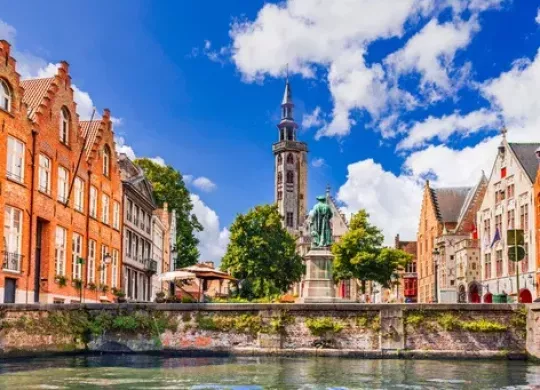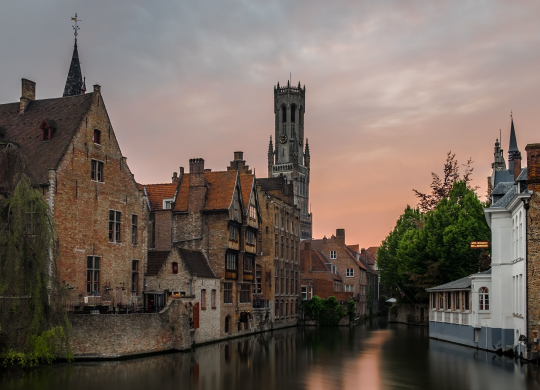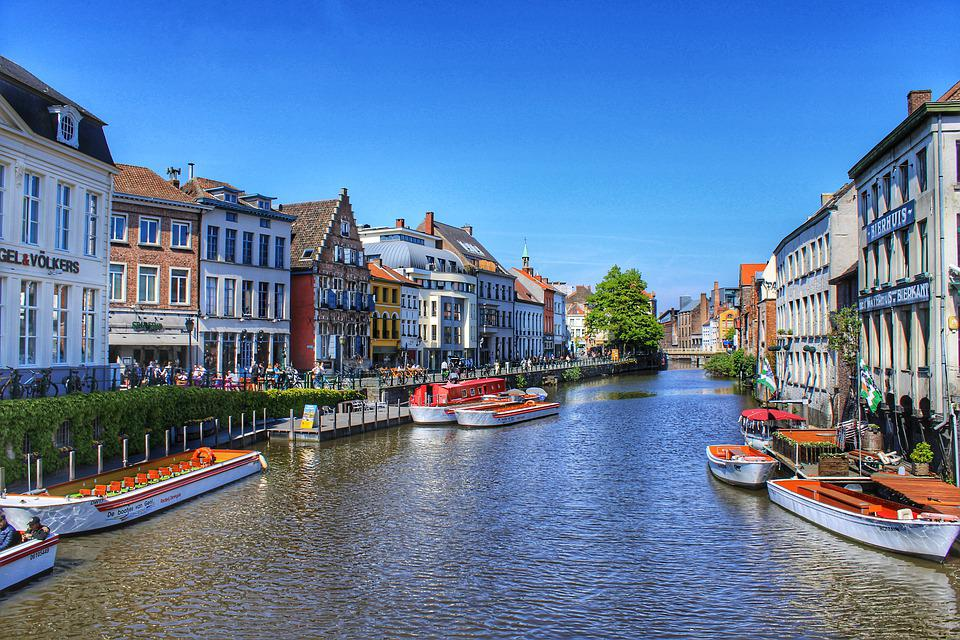Features of school and university education in Belgium: rules for applying

Let's talk about the different forms of education in Belgium. And let's start with the education system of local schools. In French-speaking Belgium, you can choose for your child an official school, i.e. a school organized by public authorities, a free school, or a public school. Free schools offer religious education and are free of charge.
Depending on the age or the specific situation of the pupil/student, there are 7 types of education:
- regular basic education (nursery and elementary school)
- ordinary secondary education,
- higher education,
- social education,
- special education,
- art education with an abbreviated schedule,
- distance education (EAD).
- Kindergarten lasts 3 years and is not compulsory. At the age of 6, children enter elementary school, which lasts 6 years:
- Elementary School 1 (ages 6 - 7)
- Elementary school 2 (ages 7 - 8)
- Primary 3 (ages 8 - 9 years)
- Elementary school 4 (9 - 10 years old)
- Elementary school 5 (10 - 11 years old)
- Primary School 6 (11 - 12 years old). In this last grade, children take the exam for the basic education certificate, which is required for admission to the next grade.
At the age of 12, Belgian children enter secondary school, which consists of two cycles:
The lower cycle: the first high school (12 - 13 years), the second high school (13 - 14 years), and the third high school (14 - 15 years).
Higher cycle: fourth high school (15 - 16 years), fifth high school (16 - 17 years), sixth high school (17 - 18 years).
As in France, it is possible to get technical, artistic, or vocational education here. At the end of secondary school students receive a certificate of second higher education (Certificat d'Enseignement Secondaire Supérieur), the equivalent of the French baccalaureate.
Higher education
Belgian universities have adopted the LMD (Licence, Master, Doctorate) system, which facilitates the equivalence of degrees in Europe. However, whichever education you wish to pursue in Belgium, you must obtain a diploma equivalent before applying. Tuition fees are on average €830 per year, which is higher than in France.
There are about thirty institutions of higher education in Belgium, where the teaching is less theoretical and more professional. The fields of study are broad: agronomy, applied arts, economics, paramedicine, pedagogy, social, technical, and translation-translation. The cost depends on the type of course, short or long-term, and averages 350 euros per year.
Finally, art schools in Belgium are popular with the French, who account for about 32% of applicants. Several areas are taught here: performing arts, comics, interior design, plastic arts, etc.
The different levels of study possible in Belgium
Bachelor's degree (180 credits / 3 years). The Bachelier complies with the license and represents the first university degree in Belgian higher education. The prerequisite for admission is a Bachelor's degree or its equivalent, while some courses require a competitive examination or numerus clausus for international students.
Master's degree (60 to 120 credits / 1 to 2 years). The master's degree is awarded one to two years after the Bachelier degree and offers specialization in a more precise field than the first three years of study while beginning research and fewer theoretical courses.
Equivalence with French degrees is usually automatic, and the master's degree is quite affordable.
Additional Master's degree (60 credits / 1 year). The supplementary master's degree is the equivalent of a specialized master's, which consists of training in a very specific field or profession to specialize in it before entering the job market after 5 years of prior study.
Doctoral degree: (180 credits / 3 years). Available after a master's degree or 300 ECTS credits after jury approval, the doctoral degree allows you to continue working on your thesis for 3 years of research under the supervision of your thesis advisor. To apply, you must have a sufficiently precise dissertation topic and written consent from your sponsor.
To find a sponsor, you need to find a professor who is active in your field of research in Belgium and offer your offer of support. You can search online and on the various websites of Belgian universities.
Free education
Access to education is free. No fees can be charged for students enrolled in preschool, elementary and secondary schools. However, several school services and supplies may be chargeable (e.g. cultural and sporting activities, photocopies, take-home school books, personal equipment costs, etc.).
Education belongs to the competence of the community and therefore depends either on the French Community (Fédération Wallonie-Bruxellestip) on the Flemish Community or the German-speaking Community.
Thus, it can be stated schematically that there are two educational networks:
1. A formal network, which includes the organizational powers held by the public authorities (Wallonie-Bruxelles Enseignement: a network organized by the Wallonia-Brussels federation, cities, provinces, or communes).
2. A free network that includes private organizational bodies created, for the most part, in the form of a non-profit association (ASBL). This network includes:
Free and non-denominational institutions (based on the principles of the secular movement or specific pedagogical concepts - Decroly, Montessori, Freinet, Steiner, etc.)
Denominational schools (Catholic, Protestant, Jewish, Islamic, Orthodox).
These governing bodies, which can be one or more natural or legal persons, are important actors in the education system in the Wallonia-Brussels Federation: They are responsible for the day-to-day management of the school (adoption and application of the school project, the appointment of the management and staff, financial, pedagogical and administrative management, etc.).
Compulsory education
In Belgium, compulsory schooling applies to all minors of compulsory school age who live or have lived in Belgium, regardless of their status.
Minors are subject to compulsory schooling for 13 years, beginning with the school year in which they turn five and ending at the end of the school year in which they turn eighteen.
The period of compulsory education consists of two parts, full-time and part-time.
The period of compulsory full-time education lasts up to fifteen years and includes one year of kindergarten, a maximum of seven years of primary education, and at least the first two years of complete secondary education. In all cases, compulsory full-time education ceases when the pupil reaches the age of 16.
The period of compulsory part-time education lasts until the end of the compulsory education period. A young person who is subject to compulsory part-time education may continue as a full-time student or choose other courses of study:
alternating secondary education (CEFA);
Education is recognized by the French Community as compulsory education (IFAPME or SFPME).
Compliance with compulsory schooling is the responsibility of the parents, the person with parental authority, or the person who has actual custody of the minor.
All foreign students of non-European origin must apply for and receive a study grant to obtain or continue their higher education in Belgium.
Student visa to Belgium
After enrolling at a university in Belgium, international students must apply for a Type D student study visa (national long-term visa).
Regardless of your level of study (post-baccalaureate, licentiate, master, or doctorate), you will know how to apply for and obtain a study visa in Belgium for international students.
To obtain a student visa in Belgium, you need to complete the following 6 formalities:
1. Obtaining admission to a university in Belgium.
2. Prepare an application for a study visa to Belgium.
3. Pay the visa fee
4. Apply for a study visa.
5. Pay the fee for the D-category study visa
6. Obtaining a study visa for foreign students in Belgium.
Belgium, like almost all European countries such as France, has established an online procedure for applying for a study visa.
It allows students to apply and track their results simply.
Every foreign student of non-European origin must complete the following steps and formalities to obtain a visa to continue or pursue higher education in Belgium (without a scholarship or with a scholarship).
1. Admission to a university in Belgium
The first step in applying for a student visa to Belgium is to enroll at a Belgian university.
2. Preparing an application for a study visa to Belgium.
The second thing to do is to prepare your visa application file.
3. pay the visa fee.
To ensure the eligibility of your student visa application, you need to pay a processing fee of €180.
You can contact the Office for Foreigners in Belgium for more information.
4. Applying for a student visa
After compiling your visa dossier and paying the processing fee, you should follow one of the following two options
Make an appointment at the Belgian Consulate in your country.
Documents to obtain a student visa to Belgium
The documents you need to submit to obtain a study visa are as follows:
All documents for this type of visa must be submitted in 3 copies (1 original + 2 copies) in the following order:
- 2 visa application forms with 3 clear and recent color photographs.
- Original certificate from an institution of higher education that mentions either.
- Final Enrollment.
- Registration for entrance examinations.
- Certificate of application for equivalence from the equivalence service of the French Community in Belgium.
- A document from the institution indicating the deadline for attending the course.
- Original diploma or baccalaureate of higher secondary education or a legalized copy of the original diploma.
- Original diplomas and certificates obtained after secondary education (all courses, even private ones, + provide transcripts).
- Commitment to take responsibility for the application, accompanied by a copy of the guarantor's ID or residence permit.
- Proof of the guarantor's ability to pay.
- A fresh statement of a legalized criminal record for applicants over 21 years of age.
- Medical certificate issued by a doctor approved by a diplomatic or consular authority in your country.
- National passport + copy of the first 6 pages. The passport must be valid for at least 1 year after the expiration of the visa.
- A photocopy of your national ID card.
- 2 stamped envelopes with the name and address of the visa applicant.
Student visas are issued for stays longer than 3 months. Students must apply for the visa before the start date of the course, given that the processing time is 15 days.
Recommended articles
3 min
Work
Jobs for foreigners in Belgium in 2024: the labor market, where to look for a job and a visa
Belgium is one of the richest countries in Europe, and its capital, Brussels, is the city where the European Commission, the Council of the European Union are located, and one of the three cities where the European Parliament is located. All these factors contribute to the employment of foreigners here. Find out what it takes to find a job in Belgium in 2024
06 Sep. 2024
More details3 min
Residence permit
Residence permit in Belgium in 2024: available types and application procedure
In order to start living in Belgium, foreigners must have certain identity documents and a residence permit. Learn more about the types of residence permits in Belgium, how to obtain a temporary or permanent residence permit, the list of documents and other important details
24 Apr. 2024
More details5 min
Treatment
All materials and articles are owned by VisitWorld.Today and are protected by international intellectual property regulations. When using materials, approval from VisitWorld.Today is required.
